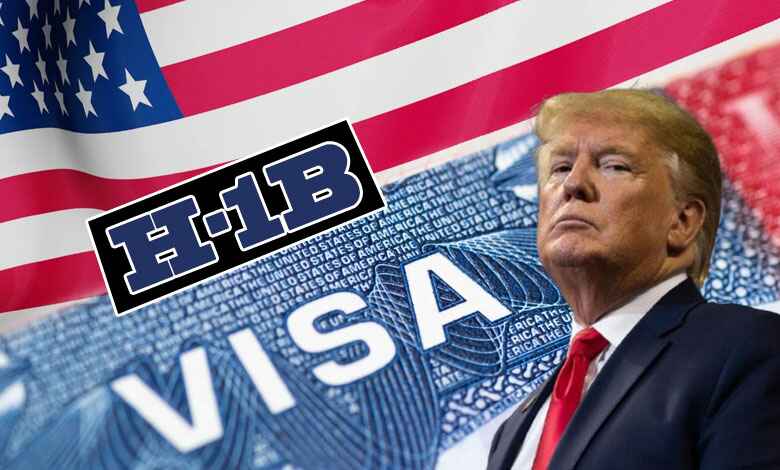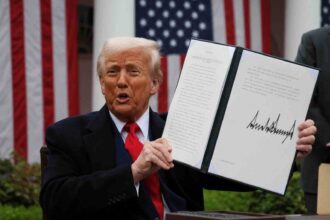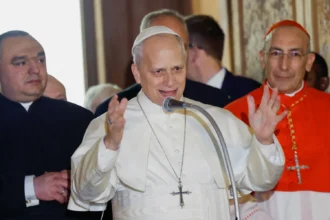- U.S. Chamber of Commerce sues Trump administration over new $100,000 H-1B visa fee.
- Lawsuit filed in D.C. District Court alleges the rule violates federal law.
- Defendants include DHS, State Department, Kristi Noem, and Marco Rubio.
- Chamber says the fee would hurt innovation, raise costs, and reduce hiring.
- Court decision could shape future U.S. immigration and employment policy.
The U.S. Chamber of Commerce has taken the Trump administration to court, filing a sweeping federal lawsuit that challenges the newly imposed $100,000 H-1B visa fee, a dramatic increase from the previous cost of roughly $3,600.
Filed Thursday, Oct. 16, 2025, in the U.S. District Court for the District of Columbia (Case No. 25-cv-3675), the complaint targets Trump’s September 19 executive order, officially titled “Restriction on Entry of Certain Nonimmigrant Workers.” The Chamber argues the measure is “unlawful” and “exceeds the President’s authority” under the Immigration and Nationality Act (INA).
The lawsuit names the Department of Homeland Security (DHS) and the Department of State as defendants, along with Kristi L. Noem, Secretary of Homeland Security, and Marco A. Rubio, Secretary of State. It seeks injunctive and declaratory relief to stop enforcement of the fee, which the Chamber says undermines decades of congressional policy.
According to the 49-page filing, Trump’s proclamation “upends a carefully crafted congressional balance” by bypassing statutory limits and imposing a six-figure cost on every new petition for skilled foreign workers. The Chamber contends this action violates federal law, lacks required notice-and-comment rulemaking, and threatens to cripple U.S. companies that rely on H-1B talent in science, technology, engineering, and health care.
The complaint warns that the $100,000 visa charge would “inflict significant harm on American businesses,” forcing them to raise labor costs or forgo hiring altogether. Smaller firms and start-ups, especially in the tech sector would be hit hardest.
“It diminishes our innovative capacity in the United States,” one Silicon Valley start-up founder said after the announcement. “It tells other brilliant people around the world that we are not open for innovation.”
A venture capitalist interviewed by the New York Times added, “There is not a single company that I have invested in the last 10 years that could afford to pay this.”
Legal experts note that if enforced, the policy could undercut America’s global competitiveness, slow job creation, and push high-tech development overseas, giving economic rivals an advantage in recruiting top international talent.
What the Chamber Argues in Court
The Chamber’s filing outlines several key legal points:
Congress, not the President, has authority to set visa fees and establish program limits under the INA.
The executive order contradicts multiple federal statutes that cap H-1B costs and require public rulemaking.
The proclamation effectively rewrites immigration law by conditioning visa approvals on an arbitrary payment unrelated to administrative costs.
The Chamber asserts the measure violates the separation of powers and relies on Section 212(f) of the INA far beyond its intended scope.
Citing precedent from Youngstown Sheet & Tube Co. v. Sawyer and Trump v. Hawaii, the lawsuit argues courts have clear authority to block presidential directives that exceed statutory power.
The H-1B program, created more than 70 years ago, allows U.S. companies to hire foreign professionals in specialized fields where domestic workers are scarce. Roughly 730,000 H-1B visa holders currently work across the American economy, many in critical STEM occupations.
The Chamber maintains that these workers boost innovation, create American jobs, and increase wages while helping address a national labor shortage that affects nearly every state. “Nearly every state is facing an unprecedented challenge finding workers to fill open jobs,” the Chamber’s own data shows.
Business leaders warn that pricing out access to skilled workers would weaken U.S. manufacturing, technology, and health-care sectors, and ultimately hurt American employees through reduced growth and lower wages.
The case is expected to move quickly, as the 2026 H-1B lottery opens in March 2026. A ruling could determine whether U.S. employers must pay the controversial new fee or continue under existing rates.
As of press time, both the White House and the U.S. Chamber of Commerce declined further comment. The administration, meanwhile, has defended the executive order as part of its “America First” initiative to protect U.S. workers.
The outcome could redefine the balance between the executive branch and Congress on immigration policy, and determine how American companies compete for global talent in the years ahead.
Download the full lawsuit PDF Here.








